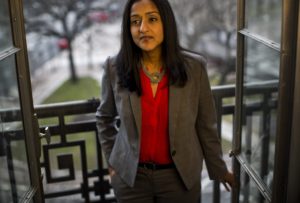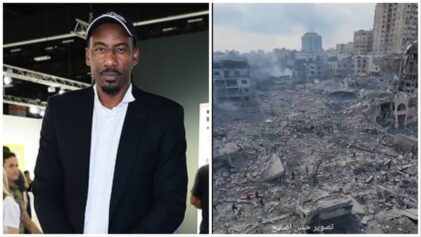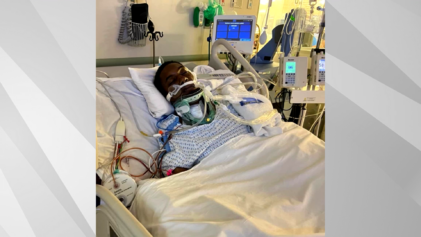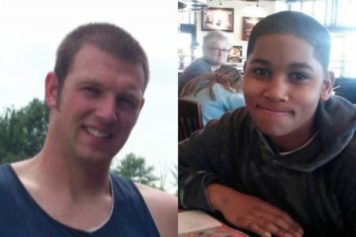“Eric Garner. Michael Brown. Tamir Rice. John Crawford. Walter Scott. Freddie Gray.”
When Principal Deputy Assistant Attorney General Vanita Gupta spoke to the crowd at the Colorado Lawyers Committee annual lunch about the realities of the severed relationship between police and the Black community, she started by listing some of the most sobering reminders of what police brutality and excessive force can really do.
It can take away sons. Snatch away fathers. Rob parents of the opportunity to see their child graduate. Make a toy, as well as hoodies and cigarettes, deadly items to have. It can completely ruin the relationship between police officers and the communities they are sworn to serve and protect.
Like many other officials have in recent months, Gupta noted this reality.
She admitted that while law enforcement is a profession that calls for bravery and great integrity, tragedy falls on an entire community when that profession becomes tarnished with senseless violence and racial bias.
But Gupta took the discussion a bit further.
Many have discussed the way poverty and poor education have helped turn cities like Ferguson and Baltimore into “powder kegs,” but Gupta cited the true origins of such problems as something that goes beyond the days of a Great Recession, a housing market crash or discriminatory bank loans.
“Mistrust can’t be explained away as the kneejerk reaction of the ill-informed or the hyperbolic,” she said. “It’s, in part, the product of historical awareness about the role that police have played in enforcing and perpetuating slavery, the Black Codes, lynchings and Jim Crow segregation. As FBI Director James Comey noted, ‘At many points in American history, law enforcement enforced the status quo, a status quo that was often brutally unfair to disfavored groups.’ “
It’s an eloquent way of reiterating one of the phrases that has become popular through the Black Lives Matter movement. While protesters once held signs that pointed to how “broken” the system is, a new wave of signs is aimed at correcting that statement.
“The system isn’t broken,” the saying goes. “It was built this way.”
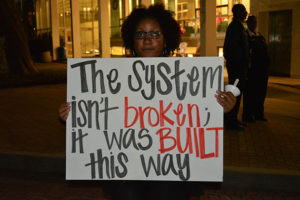
The very system that was built to enforce laws and punish criminals was erected with a clear distrust and dislike of Black citizens.
The wave of deaths of unarmed Black citizens has less to do with a change that moved America in the wrong direction. It has everything to do with a lack of change that has prohibited America from moving in any direction since the days of segregated schools and assigned seating on the back of a bus or even the days of slavery.
“The consequences of distrust between law enforcement and the communities they serve can be devastating,” Gupta added. “Where people perceive the criminal justice system to be arbitrary, biased and unfair, they are less likely to cooperate with law enforcement, making us all less safe. The distrust and alienation experienced in some communities can build into a powder keg of resentment, ready to be ignited by a single tragic incident. We have seen this over and over—in Watts in 1965, in Los Angeles in 1992 and most recently, in Ferguson in 2014.”
As America continues to ignore the problems plaguing the Black community and embracing policies that exacerbated their hardships, Gupta says officials now must accept their responsibility in causing the problem and understand their responsibility in fixing it.
“Law enforcement practices such as the stopping and frisking of young black men based on stereotypes,” Gupta continued. “Sentencing policies that result in mass incarceration, particularly of people of color. And the devastating consequences that convictions have had on individuals’ ability to find work, secure stable housing and reintegrate as full members of society. These are deliberate policy choices that we made over the last several decades. We bear the responsibility to confront their consequences.”
According to Gupta, she is ensuring that that’s exactly what happens.
She promised the crowd that reformation is kicking off within the criminal justice system and that many police departments are undergoing new types of training aimed at preventing another Ferguson or Baltimore from happening. Most importantly, however, Gupta says officials are working to see that police departments will adopt a new set of practices and policies that will keep would-be Michael Browns, Tamir Rices and Freddie Grays at the dinner table with their families rather than sprawled out on the street or dying on a hospital bed.
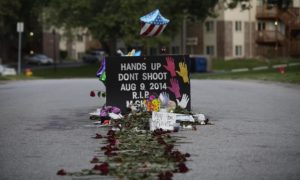
She also noted that police officers must find ways to have positive encounters with the communities they serve rather than only interacting with citizens when it’s time to make an arrest.
Gupta noted that there is much work ahead for law enforcement and that the true mission to eliminate racial discrimination and bias within the criminal justice system is one that will be a harrowing task.
As difficult of a mission as it may be, building trust and mending the relationship between police and community members will still only mark the beginning of all the changes that need to happen in order to truly address police brutality and mass incarceration, but Gupta is hopeful about the possibilities of having police, leaders and the community working together.
“This is hard, inglorious work, but it’s essential,” she concluded. “And there’s a role for anyone who wants a safer, fairer, more equal society. There is no problem too intractable or impossible for people committed to justice. Justice requires hope and hard, persistent work. We cannot sit idly by and hope that the public attention these issues are receiving will diminish, because they won’t, or at least not for long.”
